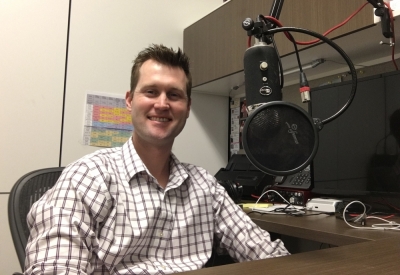 AZEMCast, an educational emergency medicine podcast, was developed in 2013 by University of Arizona emergency medicine physicians to differentiate evidence-based medicine from experience-based medicine. The podcast started out as a project for UArizona Department of Emergency Medicine residents, but has gained in popularity with more than 75,000 downloads by national and international followers.
AZEMCast, an educational emergency medicine podcast, was developed in 2013 by University of Arizona emergency medicine physicians to differentiate evidence-based medicine from experience-based medicine. The podcast started out as a project for UArizona Department of Emergency Medicine residents, but has gained in popularity with more than 75,000 downloads by national and international followers.
In October 2021, the podcast completed its 100th episode. Aaron Leetch, MD, associate professor of emergency medicine and director of the Combined Emergency Medicine and Pediatrics Residency Program, talks about the AZEMCast’s development, who’s listening and future plans.
Describe the podcast.
The podcast has gone through many iterations over the last eight years, but at its core we hoped to provide an engaging educational podcast that made a distinction between evidence-based medicine and presenter opinion. We try hard to include the elements that make print journals so effective including citations and a peer review.
How did you decide to create a podcast?
Dr. Jarrod Mosier and I started this podcast in 2013 when a lot of Free Open Access Medical Education (FOAM-Ed) presented a lot of opinions that had not yet been vetted by good science. Many of our residents were wanting to implement things they heard on a podcast that had not yet been vetted by evidence. We aimed to make our podcast unique by differentiating evidence-based medicine from experience-based medicine. From the beginning, we included audio cues for onscreen citations and an outside peer review at the end of each episode. We also included some comical sound effects to let the listener know when the opinions expressed were just opinions.
What is the purpose of the podcast?
We want the listeners to understand the difference between evidence-based medicine and experience-based medicine. While evidence-based medicine is the more valuable of the two, we can’t ignore the art of medicine. Analyzing how and why different attending physicians will work up different patients reveals a broader spectrum of how emergency medicine can be practiced.
How has the podcast evolved?
We started doing segments like many of the other popular podcasts such as EM:RAP. However over time we decided to focus on one topic and treat each episode like an audio review article. We started having one peer reviewer, Dr. Brian Drummond. We started incorporating Brian into the show so much that we needed to reach out to alumni and colleagues around the country to do our peer review. It was a great opportunity to not only emulate what scientific journals do, but also to gain wealth of experience from people practicing in different environments.
Who are your guests?
Our guests are generally guests are faculty in the UArizona Department of Emergency Medicine, alumni or colleagues in other departments. We have had a few brave residents participate as well.
Who is your audience?
Although the show is available broadly, we do the episodes for the home crowd – residents, faculty and alumni of the UArizona DEM. Yet somehow, we still have a wide range of listeners from across the U.S. and the world.
How does it feel to have finished your 100th episode?
Honestly, it’s just strange to have done that many. It’s a lot of work to coordinate but everytime I think no one is listening, I hear from a resident, nurse or alum how much they’re looking forward to the next one. Talking with Drs. Drummond, Allie Min, Chris Williams and many of the other people who have helped with these 100 episodes, we felt that 100 was a good place to take a break and regroup in the future.
Are there plans for changes in future episodes?
This past year we’ve tried something new by making the episode competitive. We’re taking cases and assigning points based on the participants’ responses. It’s a little more engaging and adds some element of “who will win” to each show. I hope to continue doing this with a broader selection of panelists and possibly even video format in the future.
Anything about the podcast you would like to add?
This podcast has been a lot of fun to do over the years. It’s a great creative outlet for me that fortunately other people have enjoyed as well.
Listen to episodes of AZEMCast on Apple Podcasts, PodBean, and Spotify.

